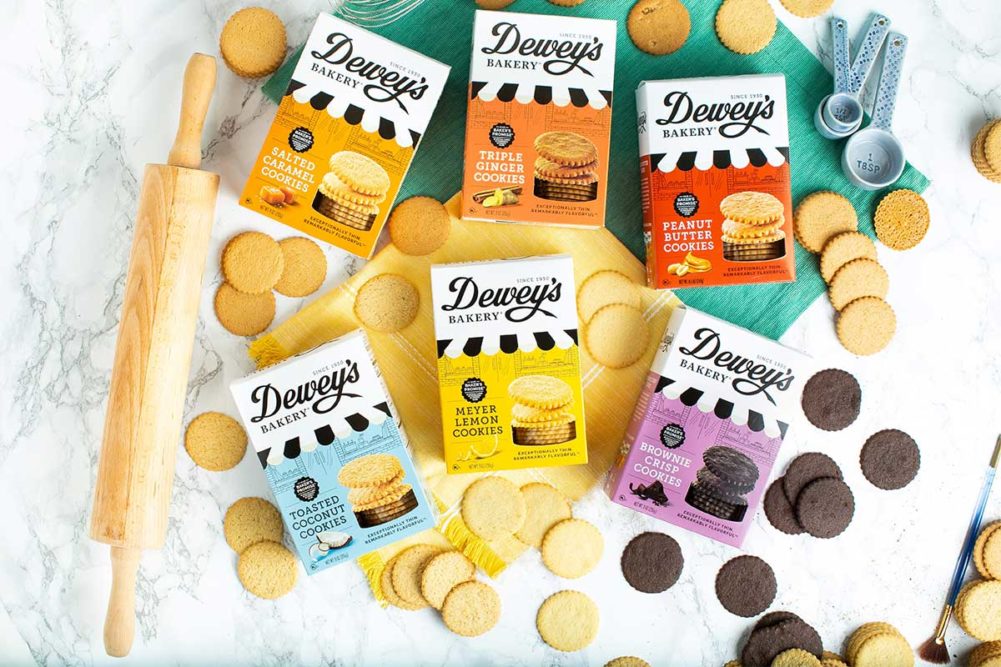In 1930, Dewey’s Bakery opened its doors in Winston-Salem, NC, and the retail shop established itself as a community staple with an enduring legacy. The operation expanded and opened a commercial bakery in 2010, but it was just five years ago that one bakery favorite, wafer-thin Moravian cookies with a powerful flavor punch, started hitting retail shelves nationwide, and they are rapidly spreading into new markets and stores.
In the fall, the business announced its partnership with Albertsons, Safeway, Jewel/Osco, Shaw’s and United supermarkets, which ramped up distribution of Dewey’s cookies by 25%, adding 2,000 stores nationwide.
“We increased our distribution by more than double last year, which is great, but we still have a lot of expansion to go,” said Mike Senackerib, chief executive officer of Dewey’s Bakery Inc. “We could double again and double again. There are enough stores out there. We continue to add more business every year.”
Dewey’s Bakery is still located in the community where it began. The company runs two commercial facilities in Winston-Salem: The Kimwell plant headquarters has nearly 100,000 square feet of space and the Jonestown plant across town is 49,000 square feet. The company also still runs three Dewey’s retail bakeries, two in Winston-Salem and one in Greensboro.
The local community remains a vital part of the company’s base, with the commercial bakeries supplying the popular Moravian cookies as well as Moravian sugar cakes, oatmeal cookies, oatmeal sandwich cookies and cheese crackers to the retail bakeries and a few items to local grocers. But the business has ambitious expansion plans as it automates processes and continues to improve operations as production ramps up.
Scott Livengood, the executive chairman, bought Dewey’s bakery from the founder’s grandchildren in 2006.
“That’s when it really began to shift from a local bakery to a national manufacturing company,” Mr. Senackerib said. “I think around 2010 is when the national expansion really started. … The commercial bakery was a way for the company to get into national cookie and cracker manufacturing on a much bigger scale.”
The commercial bakery opened its doors in 2010 to accommodate the demand for its cookies and other baked goods and started co-manufacturing for third-party private label accounts.
The company launched the Dewey’s brand in the wholesale channel in 2018, and a $25 million minority investment from the Paris-based investment firm Eurazeo in 2020 sped up its national expansion.
“The primary focus is on building our branded business and continued product innovation,” Mr. Senackerib said. “We’ve got new flavors coming out, we’ve got some fun and interesting new innovation that we’ll probably get to talk about in a few months.”
The cookies are 16 calories each, which means consumers can eat six for fewer than 100 calories.
“We fill a unique need for permissible indulgence in the cookie category,” he said. “Our products are full-flavored and yet you feel good about eating them.”
The Moravian name of the baked goods links them to the local community of Winston-Salem and the surrounding area. The Moravian Church established a community in the area in the mid-18th century and still has several congregations there.
“Calling them Moravian sugar cakes and Moravian cookies is really important locally because people do identify with them whether they are part of the church or not,” Mr. Senackerib explained. “That’s a strong component of it, but it’s also just well-known in the area.”
The sugar cakes can be found at Dewey’s bakeries and local retailers and can also be purchased online. They aren’t widely distributed through retail channels, however, because they are baked in batch ovens and difficult to produce on a massive scale.
“They’re very labor intensive,” explained David Catlett, chief operations officer. “They’re still created on sheet pans. You can smell them from a mile away. Just to walk in and smell fresh bread being baked with cinnamon and sugar and all the goodies that go into it, it just makes your mouth water. It puts a smile on your face.”
The sugar cakes are similar to a coffee cake with a dimpled surface like focaccia bread and a buttery cinnamon sugar topping. They are especially popular during the holidays, including Easter, Thanksgiving and Christmas. A dedicated staff produces them.
“We have a crew that basically works two-thirds of the year,” Mr. Catlett said. “Some of them transfer back into our normal production, but some of them are very happy working through that holiday program, specifically running that. And there’s a couple of variations or styles that we run with that. That is by far our No. 1 seller.”
The e-commerce channel of Dewey’s business is busy, especially in the fourth quarter when the gift-giving season ramps up.
“On a daily basis for the first nine months, it’s about 250 to 300 orders,” said Chuck Pruitte, vice president, operations. “During the fourth quarter, it’s closer to about 2,500 a day.”
Workers fill orders five days a week — more during the fourth quarter — from a variety of websites, such as Amazon, Deweys.com and QVC, where the company is featured several times each year. Orders are printed out the night before then hand-packed and shipped daily. Gift boxes are pre-packed with shelf-stable products then fresh frozen items — cakes and oatmeal sandwich cookies — are packed just before shipping.
“We’re going to have to look at expanding because as it gets bigger and bigger, this place gets very congested,” Mr. Pruitte said as he walked through the area where orders are processed. “As you can imagine, it gets difficult to move around.”
This article is an excerpt from the June 2023 issue of Baking & Snack. To read the entire feature on Dewey's Bakery Inc., click here.





